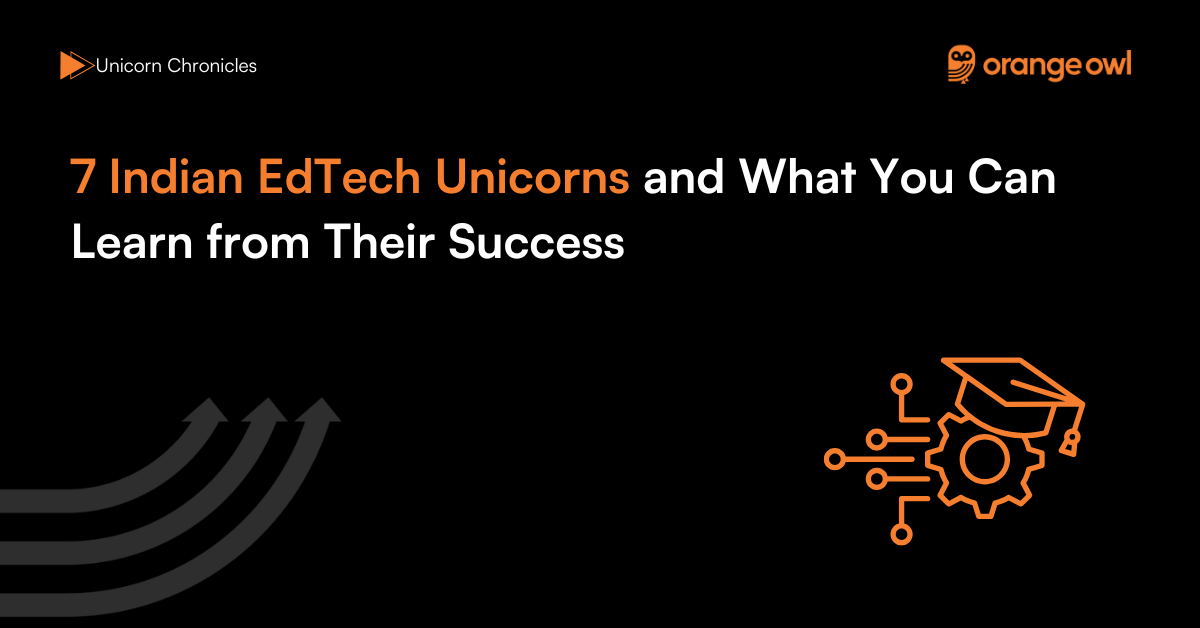7 Indian EdTech Unicorns and What You Can Learn from Their Success
Vivek Goel
June 7, 2025

Table of Contents
Introduction
India’s edtech unicorns are more than just online learning platforms—they’re catalysts driving a seismic shift in how the nation learns, upskills, and competes globally. As of May 2025, India is home to 119 unicorns, with the education sector contributing some of the most impactful and widely adopted innovations in the digital economy.
These startups have not only disrupted traditional classrooms but also democratized access to quality education, empowered teachers with technology, and bridged learning gaps across urban and rural divides. From live interactive classes and competitive exam prep to professional upskilling and hybrid learning centres, India’s edtech unicorns are solving uniquely Indian problems at scale.
In this curated roundup, we spotlight 7 standout edtech unicorns—BYJU’S, upGrad, Unacademy, Vedantu, Eruditus, LEAD School, and Physics Wallah—each reshaping a distinct vertical within education through product innovation, mission-first leadership, and hyper-scalable models.
Whether you’re building an edtech startup, investing in future-of-learning platforms, or simply curious about what’s working in India’s education revolution, these stories reveal powerful strategies for scaling impact, driving trust, and winning in an intensely competitive landscape.
Let’s decode the winning playbooks and uncover every lesson from Indian EdTech Unicorn success—one unicorn at a time.
1. Physics Wallah: Making Affordable Education a Reality
Physics Wallah (PW) started as a humble YouTube channel by Alakh Pandey, aimed at simplifying science concepts for students preparing for JEE and NEET. What began as a one-man teaching initiative quickly snowballed into a full-fledged edtech platform, offering affordable, high-quality exam prep content for millions of aspirants across India.
With a sharp focus on Bharat, not just India, PW cracked the code by pricing its courses as low as ₹500–₹2,000, making it accessible to students from Tier 2 and Tier 3 cities who were previously priced out of the edtech boom. The platform scaled rapidly through organic word-of-mouth, low-cost operations, and a teacher-led content model, now reaching over 10 million monthly active users.
Unlike many edtech giants that burned cash chasing growth, PW stayed profitable from day one, proving that frugality, authenticity, and impact can beat flashiness and funding.
Key Lessons:
- Solve for Bharat, not just India. Affordable pricing and regional language content unlock massive scale.
- Build around your teacher brand. Students trust educators, not just platforms.
- Keep operations lean. Sustainable unit economics matter more than vanity metrics.
- Organic growth compounds. Word-of-mouth from real users trumps paid ads.
2. Vedantu: Live Learning at Scale
Vedantu pioneered the live online tutoring model in India long before it became mainstream. Founded by former IITians, it focused on delivering real-time interactive classes for students from grades 6 to 12, covering boards, Olympiads, and entrance exams like JEE/NEET. Unlike pre-recorded video models, Vedantu bet early on two-way learning, believing engagement is the key to outcomes.
As internet penetration deepened post-2016, Vedantu scaled by blending AI-enabled teaching tools, a strong pool of trained teachers, and data-driven personalisation. Its signature “WAVE” platform allowed for the smooth delivery of live classes, helping it stand out in a crowded edtech space. By 2022, Vedantu was reaching 35 million+ users monthly and had raised over $200 million in funding.
Despite growing competition, Vedantu stayed focused on learning impact, not gimmicks—positioning itself as a pedagogy-first platform rather than a content factory.
Key Lessons:
- Bet on live and interactive formats early. Engagement beats passive consumption.
- Build proprietary teaching tech. Platforms like WAVE boost scale and learning outcomes.
- Use data for personalisation. Every learner is different—track and adapt.
- Invest in teacher quality. Great pedagogy is a bigger moat than celebrity marketing.
3. LEAD School: Modernising Affordable Education
LEAD School is transforming affordable private schools across India by offering a full-stack edtech solution—including curriculum, teacher training, assessments, and tech infrastructure. Targeting Tier 2–4 cities, LEAD partners directly with budget schools to improve student learning outcomes while helping schools digitise operations and stay competitive.
Unlike direct-to-consumer edtech models, LEAD took a B2B2C approach, embedding itself as the academic backbone of over 9,000+ schools and impacting more than 5 million students. Its standardised teaching modules, centralised assessments, and data-led insights ensure quality learning even in under-resourced settings. By solving for both access and quality, LEAD is helping democratise education at scale.
Key Lessons:
- Solve for infrastructure, not just content. A full-stack model ensures impact at scale.
- Empower teachers, don’t replace them. Pedagogy-first thinking builds trust in schools.
- Go B2B2C to scale affordably. Partnering with schools drives faster adoption in Bharat.
- Focus on outcomes in underserved markets. Real impact > vanity metrics.
4. upGrad: Career-Focused Online Learning at Scale
upGrad is building India’s largest career acceleration platform, offering online degrees, certifications, and upskilling programs in partnership with top universities globally. Unlike many edtech players focused on K–12 or test prep, upGrad targets working professionals and graduates looking to advance their careers through industry-relevant education.
With over 10 million learners across 100+ countries, upGrad combines content, coaching, mentorship, and job placement into one seamless ecosystem. Its outcome-driven approach, focus on high-return programs like data science, MBA, and law, and strategic acquisitions (like Talentedge and Harappa) have helped it become a global leader in higher edtech.
Key Lessons:
- Go beyond content—sell outcomes. Learners pay for career growth, not just videos.
- Higher ed is a global play. Scale by going international and forging global partnerships.
- Bundle services to increase value: mentorship, career support, and placement matter.
- Work with universities, not against them. Collaboration beats disruption in higher ed.
5. Unacademy: From YouTube Channel to Learning Empire
Unacademy started as a YouTube channel and grew into one of India’s largest online learning platforms, focused primarily on test preparation for competitive exams like UPSC, SSC, NEET, and more. It created a scalable ecosystem by onboarding thousands of top educators, enabling live classes, doubt-clearing, and gamified learning experiences.
With over 100 million learners, Unacademy democratized access to top-quality education in Tier 2 and 3 India. Its freemium model, backed by a strong content engine, helped it scale rapidly, while offline centres and live test series deepened its learner engagement.
Key Lessons:
- Leverage content platforms to build audience trust. Start where users already are.
- In test prep, quality educators are the product. Invest in your teaching talent.
- Gamification boosts retention. Learning sticks when it’s engaging.
- Online-offline integration drives deeper outcomes. Hybrid is the future of edtech.
6. Eruditus: Bridging Global Executive Education with India
Eruditus transformed executive education by partnering with top global universities like MIT, Harvard, and Wharton to offer online and hybrid programs tailored for working professionals in India and emerging markets. By blending world-class content with flexible learning formats, Eruditus made premium education accessible beyond traditional classrooms.
With over 70,000 alumni and rapid international expansion, it created a trusted brand in upskilling and reskilling, focusing on career impact and network-building. Their data-driven approach to course design and student outcomes sets them apart in the competitive edtech space.
Key Lessons:
- Global partnerships unlock credibility and reach.
- Focus on career outcomes, not just content delivery.
- Hybrid models meet diverse learner needs.
- Data-driven personalisation scales impact.
7. BYJU’S: Revolutionising Learning with Tech-Driven Personalisation
BYJU’S transformed India’s edtech landscape by creating a highly engaging, personalised learning app that combines interactive videos, quizzes, and gamification to make education enjoyable and effective. By focusing on concept clarity, adaptive learning paths, and strong brand partnerships like with Shah Rukh Khan, BYJU’S built a trusted global brand reaching millions of students.
With aggressive user acquisition, strategic content expansion across grades and competitive exams, and continuous technology innovation, BYJU’S set new standards for scaling edtech in India and beyond.
Key Lessons:
- Personalisation drives deeper engagement.
- Strong brand ambassadors build trust.
- Aggressive user acquisition fuels growth.
- Diversify content to expand markets.
Conclusion
These 7 Indian edtech unicorns didn’t just digitise classrooms—they transformed how a nation learns, upskills, and aspires. From BYJU’S scaling personalised K–12 learning to upGrad reshaping professional education, each startup redefined learning journeys with a mix of technology, pedagogy, and purpose.
What sets them apart is not just their tech platforms, but their deep commitment to outcomes—whether it’s making global Ivy League programs accessible, democratizing test prep for Tier-2 cities, or enabling teachers to become entrepreneurs through integrated school systems.
Their stories reveal powerful insights for every entrepreneur:
- Solve for learning outcomes, not just content delivery.
- Build trust with parents, students, and educators alike.
- Invest in quality—whether it’s faculty, UX, or certifications.
- Leverage data to personalise, adapt, and scale.
- Stay agile in response to regulation, pricing shifts, and real-world feedback.
India’s edtech unicorns prove that when you blend mission with metrics and empathy with innovation, you don’t just build companies—you shape futures. Their journeys are not just about valuation, but impact at scale, setting a global benchmark for what education startups can achieve.
👉 Want to dive deeper?
Explore all the Unicorn Chronicles here: orangeowl.marketing/unicorn-chronicles


